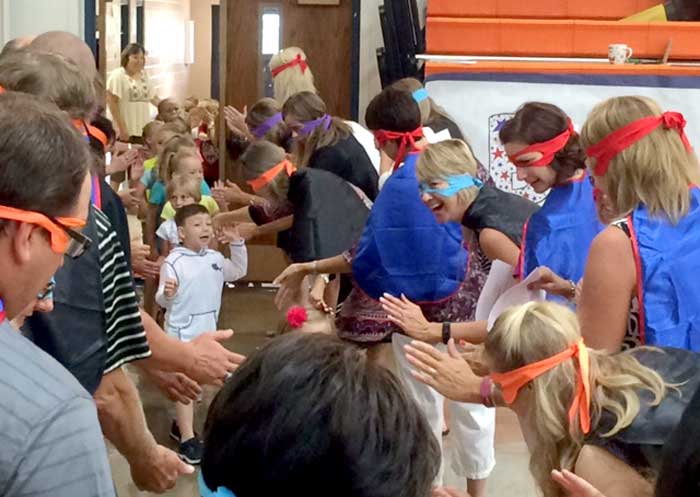Schools That Care
- Need: To provide mental health services to rural Kansas students and their families.
- Intervention: The Schools That Care project provides mental health treatment and case management as well as community education events.
- Results: From 2018 to 2021, 3,456 individuals participated in health education and counseling activities offered to the public, and 964 individuals and 303 families received direct services through the Family Advocate.
Evidence-level
Promising (About evidence-level criteria)Description

Kansas's rural Marshall and Nemaha counties are working to improve their communities' mental health by addressing behavior issues, homelessness, truancy, and suicide prevention. Within one school, three high school students had attempted suicide between 2013 and 2015 and four parents of students within the same class had died by suicide between 2007 and 2010. To improve students' and families' mental health, Unified School District (USD) #380 Vermilion and USD #498 Valley Heights created the Schools That Care project, now run by USD #498 Valley Heights for its schools. Schools That Care ensures that students, their families, and the larger community have access to mental healthcare and education.
The two school districts formed a partnership with the School-Business Educational Consortium, Nemaha Valley Community Hospital, Pawnee Mental Health Services, and a for-profit telecommunications business.
Schools That Care received a 2015-2018 Federal Office of Rural Health Policy (FORHP) Rural Health Care Services Outreach grant and a 2018-2021 FORHP Rural Health Outreach grant. After the first grant period ended, services were integrated into school settings with some changes. For example, the districts had hired a shared social worker during the grant period, but one school district later hired the social worker full-time and the other district hired a full-time counselor for its elementary school. The second grant allowed project coordinators to expand Schools That Care services to pre-kindergarten students, Parents as Teachers families, and school district families.
Services offered
Schools That Care provides the following types of services:
- Mental health treatment
- Education about mental health
- Case management
Schools have created Mental Health Prevention/Early Intervention Teams and implemented Assessment, Communications, and Strategic Plans. School districts also designated an Evaluator/Strategic Planner and educated staff on the evidence-based curriculum to be used. In the second year of the 2015-2018 grant, schools created or updated their existing mental health policies and procedures.
Schools also provide community events on mental health education and designated a "de-escalation" space where students can go while experiencing a mental health issue.
Results
One homeless family was connected with resources, and a student who was planning to drop out was connected with appropriate resources and decided to remain in school. Other results from the 2015-2018 grant include:
- 96% of staff have received training
- A social worker was hired to serve both school districts' students and their families
- 545 people received behavioral health services through the social worker
- The number of unique mental health services offered at each school district increased from 1 to 14
- 3,227 people have participated in community events on mental health and disease management
Results from the 2018-2021 grant include:
- 3,456 individuals participated in health education and counseling activities offered to the public
- 964 individuals and 303 families received direct services through the Family Advocate
- 269 preschool students received a bullying prevention curriculum
- 213 preschool students received a child abuse prevention curriculum
- 14 donation drives were conducted to collect clothing, blankets and towels, diapers and wipes, school supplies, hygiene items, and cleaning supplies
Challenges
The funding from the 2015-2018 grant came toward the end of the school year, so it was difficult to schedule staff trainings when the school calendar for the following year was already set.
There's an absence of available and consistent data collection at the local and state level pertaining to the mental health status of students. In addition, there's a mental health stigma and a lack of consistent mental health messages at the local level.
Replication
Project coordinators relied on radio announcements, newspaper articles, and school websites and newsletters to advertise community events and other information.
School staff and the social worker received training in how to collect data. In addition, students and school staff received the following trainings and curriculum:
- Kansas Social, Emotional, and Character Development Model Standards, for K-6th grade teachers
- Youth Mental Health First Aid, for 7th-12th grade staff and community members
- AlcoholEdu for High School, for high school students
- Yellow Ribbon Suicide Prevention Program, for 7th-12th students and staff
- Olweus Bullying Prevention Program, for K-12 students

Contact Information
Amanda Parthemer, Project DirectorSchool-Business Educational Consortium
785.292.4453
amandap@bluevalley.net
Topics
Children and youth
· Families
· Mental health
· Schools
· Suicide and suicide prevention
States served
Kansas
Date added
April 17, 2019
Suggested citation: Rural Health Information Hub, 2025 . Schools That Care [online]. Rural Health Information Hub. Available at: https://www.ruralhealthinfo.org/project-examples/1057 [Accessed 28 February 2026]
Please contact the models and innovations contact directly for the most complete and current information about this program. Summaries of models and innovations are provided by RHIhub for your convenience. The programs described are not endorsed by RHIhub or by the Federal Office of Rural Health Policy. Each rural community should consider whether a particular project or approach is a good match for their community’s needs and capacity. While it is sometimes possible to adapt program components to match your resources, keep in mind that changes to the program design may impact results.
